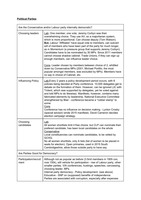Political Parties
Are the Conservative and/or Labour party internally democratic?
Choosing leaders Lab: One member, one vote; Jeremy Corbyn was their
overwhelming choice. They use AV, so a majoritarian system,
which is more proportional. Can choose deputy (Tom Watson).
But, L abour “Affiliates” have equal vote to members, can subvert
will of members who have been part of the party for much longer,
as in Momentum (a pressure group that supports Jeremy Corbyn).
Candidates have to be nominated by 30 MPs. Since 2011 members
cannot choose shadow cabinet. Trade Unions, if they can sign up
enough members, can influence leader choice.
Cons: Leader chosen by members between choice of 2, whittled
down by Conservative MPs (2001, Michael Portillo, the most
popular amongst members, was excluded by MPs). Members have
no say in choice of Cabinet, etc.
Influencing Policy Lab:Every 2 years a policy development period occurs, with 8
policies being decided at Party conference. 10,000 delegates get to
debate on the formation of them. However, can be ignored (JC with
Trident, which was supported by delegates, yet he voted against
and told MPs to do likewise). Manifesto, however, contains many
fabricated elements by leadership. National Executive Committee
strengthened by Blair - conference became a “rubber stamp” to
some.
Cons
Conference has no influence on decision making - Lynton Crosby
(special advisor) wrote 2015 manifesto. David Cameron decides
election campaign strategy.
Choosing Lab
candidates All women shortlists limit it free choice, but CLP can nominate their
prefered candidate, has been local candidates on the whole
Conservative
Local constituencies can nominate candidates, to be vetted by
GCHQ.
No all women shortlists, only A lists (list of women to be placed in
seats for election). Open primaries, used in 2015 South
Cambridgeshire, allow those outside party to have say.
Are Parties Good for Democracy?
Participation/recruit Although not as popular as before (3.5mil members in 1955 con,
ment now 150k), still vehicle for participation - rise of Labour party, other
smaller parties. VIA conferences, hustings, speeches, canvassing,
choosing leader, MPs.
Internal party democracy - Policy development. (see above)
Educative - SNP on (supposed) benefits of independence.
Parties are associated with corruption, especially after expenses




